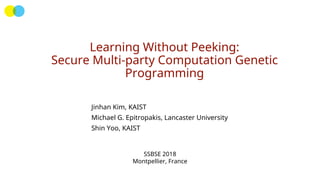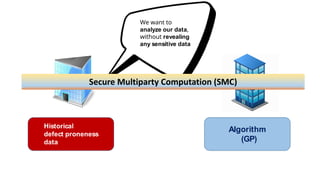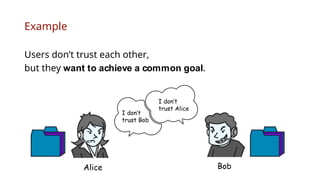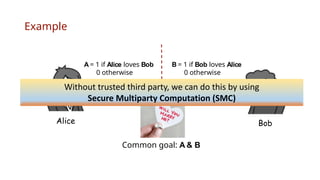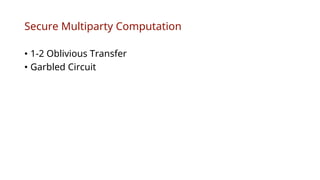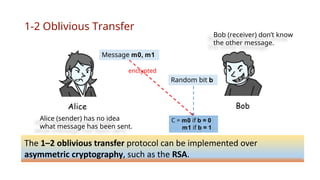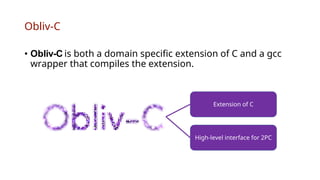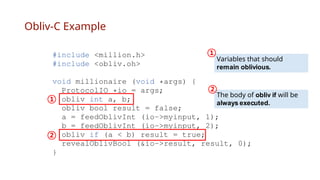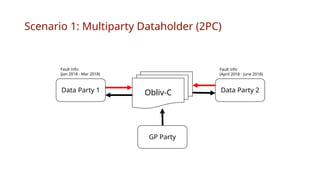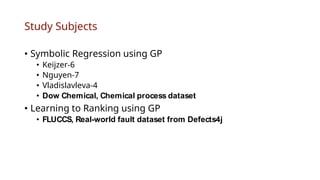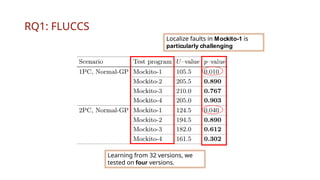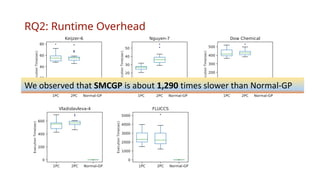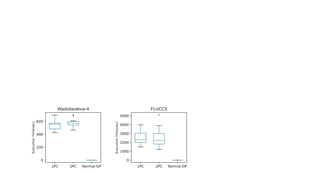Learning Without Peeking: Secure Multi-party Computation Genetic Programming
- 1. Learning Without Peeking: Secure Multi-party Computation Genetic Programming Jinhan Kim, KAIST Michael G. Epitropakis, Lancaster University Shin Yoo, KAIST SSBSE 2018 Montpellier, France
- 2. Genetic Programming • GP has been successfully applied to various domains. Data Security Test coverage data Defect proneness data Internal resources
- 3. Historical defect proneness data Algorithm (GP) We want to analyze our data, without revealing any sensitive data Secure Multiparty Computation (SMC)
- 4. Example Users don’t trust each other, but they want to achieve a common goal. Alice Bob I don’t trust Bob I don’t trust Alice
- 5. Example Alice Bob A = 1 if Alice loves Bob 0 otherwise B = 1 if Bob loves Alice 0 otherwise Common goal: A & B Without trusted third party, we can do this by using Secure Multiparty Computation (SMC)
- 6. Secure Multiparty Computation • 1-2 Oblivious Transfer • Garbled Circuit
- 7. 1-2 Oblivious Transfer Alice Bob Message m0, m1 Random bit b C = m0 if b = 0 m1 if b = 1 Alice (sender) has no idea what message has been sent. Bob (receiver) don’t know the other message. The 1–2 oblivious transfer protocol can be implemented over asymmetric cryptography, such as the RSA. enctypted
- 8. Garbled Circuit Alice (garbler) Bob (evaluator) Alice garbles (encrypts) the circuit, and sends with her input (encrypted) ①Bob evaluates (decrypts) the circuit, using oblivious transfer ②
- 9. Obliv-C • Obliv-C is both a domain specific extension of C and a gcc wrapper that compiles the extension. High-level interface for 2PC Extension of C
- 10. Obliv-C Example Variables that should remain oblivious. The body of obliv if will be always executed.①② ①②
- 11. Secure Multiparty Computation GP GP Obliv-C Fitness evaluation Data
- 12. Scenario 1: Multiparty Dataholder (2PC) Obliv-CData Party 1 Data Party 2 GP Party Fault info (Jan 2018 - Mar 2018) Fault info (April 2018 - June 2018)
- 13. Scenario 2: Singleparty Dataholder (1PC) Obliv-CData Party GP Party
- 14. Study Subjects • Symbolic Regression using GP • Keijzer-6 • Nguyen-7 • Vladislavleva-4 • Dow Chemical, Chemical process dataset • Learning to Ranking using GP • FLUCCS, Real-world fault dataset from Defects4j
- 15. RQ1: How well does the SMCGP perform compared to the Normal-GP? SMCGP and Normal-GP have same logic, do same job
- 16. RQ1: Symbolic Regression There is no statistical difference between SMCGP and Normal-GP For 2PC, we split dataset in half
- 17. RQ1: FLUCCS Localize faults in Mockito-1 is particularly challenging Learning from 32 versions, we tested on four versions.
- 18. RQ2: What is the runtime overhead of SMCGP when compared to Normal-GP?
- 19. RQ2: Runtime Overhead We observed that SMCGP is about 1,290 times slower than Normal-GP
